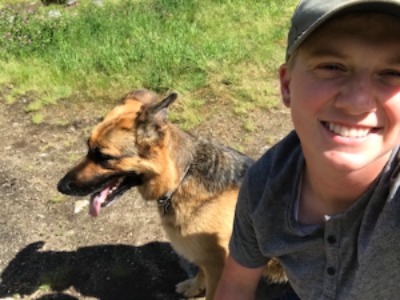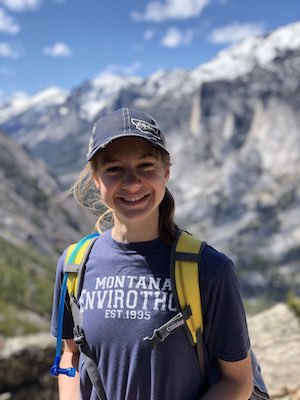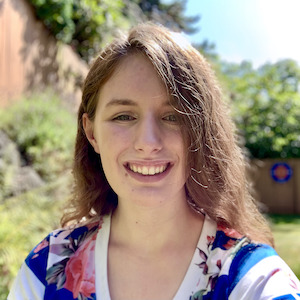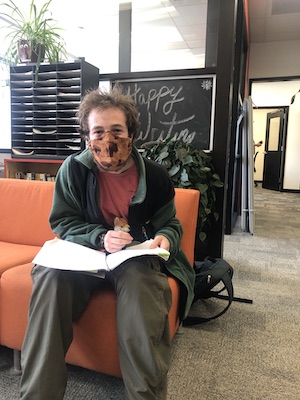Orange Couch Community
Writer Spotlights
 Emily Hicks
Emily Hicks
Emily Hicks is a senior Animal Science major with a big, big love for animals (especially horses and dogs), but also a love for people. As she’s gone through college, she’s proud to have gotten to the point where she felt she could synthesize and effectively explain complex scientific ideas in writing.
She began the process of applying to vet school last year. She’s particularly proud of her vet school application essays because they forced her to articulate her strengths and desires to justify her career path, when writing about herself confidently is something she particularly struggles with. “I had a clear reason why I wanted to go to vet school, but I had to actually think about it more like, ‘Oh, OK, I want to do this for the rest of my life.’” For her, writing the application essay let her “showcase what I mean when I say I want to be a vet.”
In her major she’s written lab reports, research analyses, a horse barn biosecurity report, and research papers on topics like livestock genetic diseases. Her biggest piece of advice? “Start early and meet with people.” She recounted how she went through multiple rewrites of her essays, and how helpful it was to get feedback throughout the process: “Go to the Writing Center, or anybody, or a friend, or somebody you know is good at writing.”
Still, for Emily, “most of the time, writing is pretty solo.” While she likes to bring writing to TAs and professors for feedback when she can, 75% of the time she’s working alone. It’s much easier to write things that she’s interested in, and when asked, the recently discovered confidence in her writing comes down to experience. “Sound like a boomer when I say that, but you don’t get better at writing unless, like, you keep writing, which sounds philosophical, and everybody hates to hear it.”
Wensdae Emersyn Antoine
Wensdae Emersyn Antoine has been writing creatively since she could tie her shoes, and grins when she mentions a journal full of short stories inspired by dreams she had when she was 12. Now a sophomore studying film and criminology, Wensdae says her love of stories has fueled her interest in film editing and scriptwriting.
The language of scripts is concise and often only detailed enough to allow the director’s imagination to bring the story to the screen. Because of her foundation in creative writing, Wensdae describes scriptwriting as “almost a completely different art.”
Wensdae cites this bare-bones style as a challenging adjustment: “I’m learning to say the same things with fewer words… just trying to be more clever about it.” Students are given a scriptwriting assignment in the very first film course and set loose with little instruction. This thrown-into-the-deep-end style forces students to do their own research on the structure of a story and replicate the strict formatting of industry standards. Later in the major, the introductory scriptwriting course clarifies many misconceptions and mysteries of the art form, though Wensdae wishes more resources were available right off the bat.
When asked about the benefit of scriptwriting for students who may not be interested in that aspect of the industry, she is adamant that “regardless of whether or not scriptwriting is going to be relevant to exactly what you're doing, understanding a story will always be relevant.”
Another way film majors learn how to structure stories is through film analysis. Though significantly less beloved than scriptwriting, she recognizes the importance of these assignments to a career in the film industry. Wensdae points to these analyses as the exercises through which students understand the elements of a film, how they move together, and to what effect.
Whether she is sitting down to write a script, a short story, or an essay, she knows she’s developing her own unique voice—one that may be hitting screens near you.
 Jordan Smith
Jordan Smith
Jordan Smith, a sophomore Rangeland Ecology major, hopes to someday work for a federal land management agency doing range monitoring and planning – with the Bureau of Land Management, Forest Service, or Natural Resource Conservation Service. In Technical Writing, a major-required class, she geared her business plan proposal essay towards her interests, asking her parents if they could introduce sheep to their family ranch.
“I’ve not learned a lot about the grammatical side of English” in classes, she said, but she’s gained a lot from learning how to approach the writing process, and the “importance of having an outline before you start writing.” In her wildlife nutrition class, she’s been co-writing a report on food availability to help a local landowner introduce white-tailed deer onto his property. As a class, they’ve been working together with the owner to calculate concrete nutrition requirements for the deer in different seasons and life stages, “and just writing a lot about why we chose the numbers we did to present to him.”
A lot of the report-writing process is not just organization on an individual level but working together as a class, sharing resources, creating an outline, and assigning roles. Her advice is to keep a document open to paste URLs into as you research and writing bullet points so you have a concise breakdown of each source as you write. “I think I’m best at the research side of it,” she said, finding the sources she needs and “presenting them in an organized way.”
Jessie Reed
Jessie Reed, a senior in Community Health, has had to write a lot of research essays for her classes. Some of them can be over thirty pages, but she doesn’t let that intimidate her. In fact, “it’s much easier for us to write these essays because we do get a little bit of freedom, in the sense that we get to choose what to write about.”
Still though, Jessie has developed a few strategies to help her out. “Doing just a little blurb for each section” is one strategy she uses to help her organize her papers, keeping her focused and making sure she hits all the main points of the essay. Jessie also likes to write short summaries of the research papers she finds, making the useful information within them more accessible and easier to find. These organizational tips help her tackle those essays, one page at a time.
Jessie’s research essays aren’t the only genre of writing she’s encountered in the world of HHD. Writing in the nursing field is often done online with short, technical reports for staff, recorded in their digital patient portals. Despite their brevity and informal nature, it is important to be as precise and technical as possible, as it can be the only form of communication between healthcare workers. With something as vital as the patient’s life on the line, communication is key. Luckily, she’s gotten practice authoring these reports through her class-internship. Together with the knowledge she’s gained from writing research essays, Jessie is confident in the communication skills she’s developed.
 Katrina Rowland
Katrina Rowland
Did you know that naked mole rats don’t get cancer? I didn’t either, but Katrina Rowland, a pre-med student in Cell Biology and Neuroscience, couldn’t help but explain it to me. While conducting a journal review for one of her biology classes, she found out that the reason these rodents are so cancer-resistant is that they have a gene called P16 which shuts down cell division earlier than most other animals.
Her passion for the medical field means that projects like that, or weekly medical reports for her Anatomy and Physiology, are a blast. “I really enjoy learning about that stuff, figuring out how it all works.” For her, going in-depth on a three-paragraph weekly report is more of a reward than a chore.
Not all writing for her pre-med classes is as enjoyable though. Katrina was “not super stoked” about doing an upcoming lab report since chemical equilibrium doesn’t quite rile her up the way learning about cancer in naked mole rats does. Still, Katrina’s worked through it by hopping into her professor’s office hours and asking questions. When it’s time to get down to business, she tries to spill out all her ideas and basic outline in one go, taking on a more casual tone early into the paper. Even when writer’s block hits, Katrina has a way to get through that too. “I’ll usually just give it a day or two. I find that stepping away from it for a little while and coming back to it later usually helps recenter myself.”
Ultimately, “writing is a means of expression,” and every genre has its place. Whether it’s the drab lab reports asked for by TAs or research papers that have taught her more than her lectures, they both express ideas that needed to be expressed.
Tia Doney
Tia Doney is a senior film major with a love for creating new worlds. With a few full novels in the works, short stories, scripts, and documentary short films, it’s clear that Tia will not confine her storytelling to one medium.
In many ways, her relationship with writing—what she refers to as “painting with words”—is unique: Tia is severely dyslexic, reading at “85 words a minute, which is an average 5th grade level and I spell at a fourth-grade level.” But she’s always been fascinated by the idea of scriptwriting and was eager to learn how by majoring in film.
In the introductory scriptwriting course, students brings in short pieces of original work and share their creations with the class, receiving constructive feedback from their instructor and peers. This environment allows for emerging filmmakers to explore what kinds of stories they want to tell and how to best tell them.
In this class, Tia wrote the assignment she’s proudest of, she says with a smile. She wrote a modern rendition of one of her favorite traditional Assiniboine stories, about how the Big Dipper and the Northern Star came to be. Part of the assignment is to submit your finished script to a scriptwriting competition or two—Tia’s original work made it all the way to the quarterfinals.
“Despite being so open about my disability, I’m always doubting myself when it comes to certain things... so the fact that it went so far in a competition with over 13,000 submissions? I was super proud of that.”
Now that graduation is just around the corner, she’s looking into a Master’s in creative writing with a scriptwriting focus. Tia’s main piece of advice for writers is to “ask people for their opinions and don't just ask the same people constantly. Because the more diverse of a group looking at it, the more likely it will translate into something good.”
 Santo Mallon
Santo Mallon
Santo Mallon, a Land Rehabilitation major, will joke that he doesn’t know how to write. “I’ve gotten through this whole time by telling other people what to write and then they type it down.” His proclaimed inability hasn’t stopped him from writing things like geology field reports, ethnographies on the Greek Orthodox community in Portland, lab reports, and short stories throughout his elaborate educational career.
His experiences with creative writing, from short stories in elementary school about kids escaping from the Red Baron to more recent creative writing courses, have shaped his attitudes towards scientific writing. He encourages going into detail. “Especially with imagery. Just have fun.” He says, “the more people who can have fun reading a scientific paper on nitrogen fixation in, I don’t know, some obscure legume on some obscure island in the South Pacific,” the better. He also strongly believes that scientific writing should be accessible to those that can implement change, like farmers and politicians, and additionally to audiences that might not necessarily have a scientific background.
A man of controversy, one of Santo’s writing tips is to write essays in Comic Sans. Before you write it off, know that it has scientific backing because it’s more mentally engaging, and it’s recommended for dyslexic readers. Santo’s motives are simpler: “I think it's more fun.” He likes to push boundaries in his writing, noting that “writing is a part of language and language changes.” There’s a certain wisdom and pragmatism in his approach to both writing and life that comes through as a love for fun and willingness to embrace change – all, of course, in the name of science.
Orange Couch Newsletter
View issues at our Mailchimp home.
